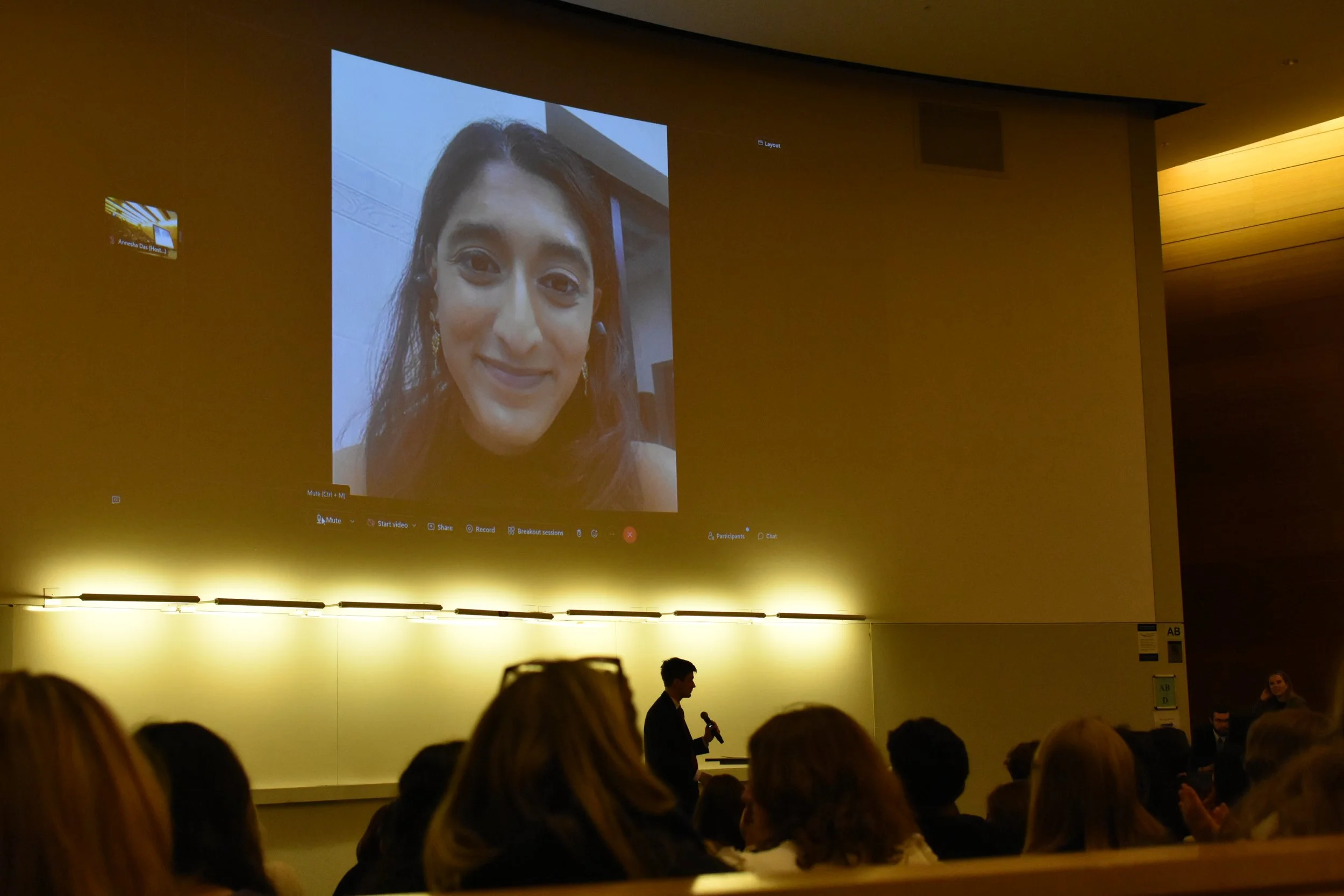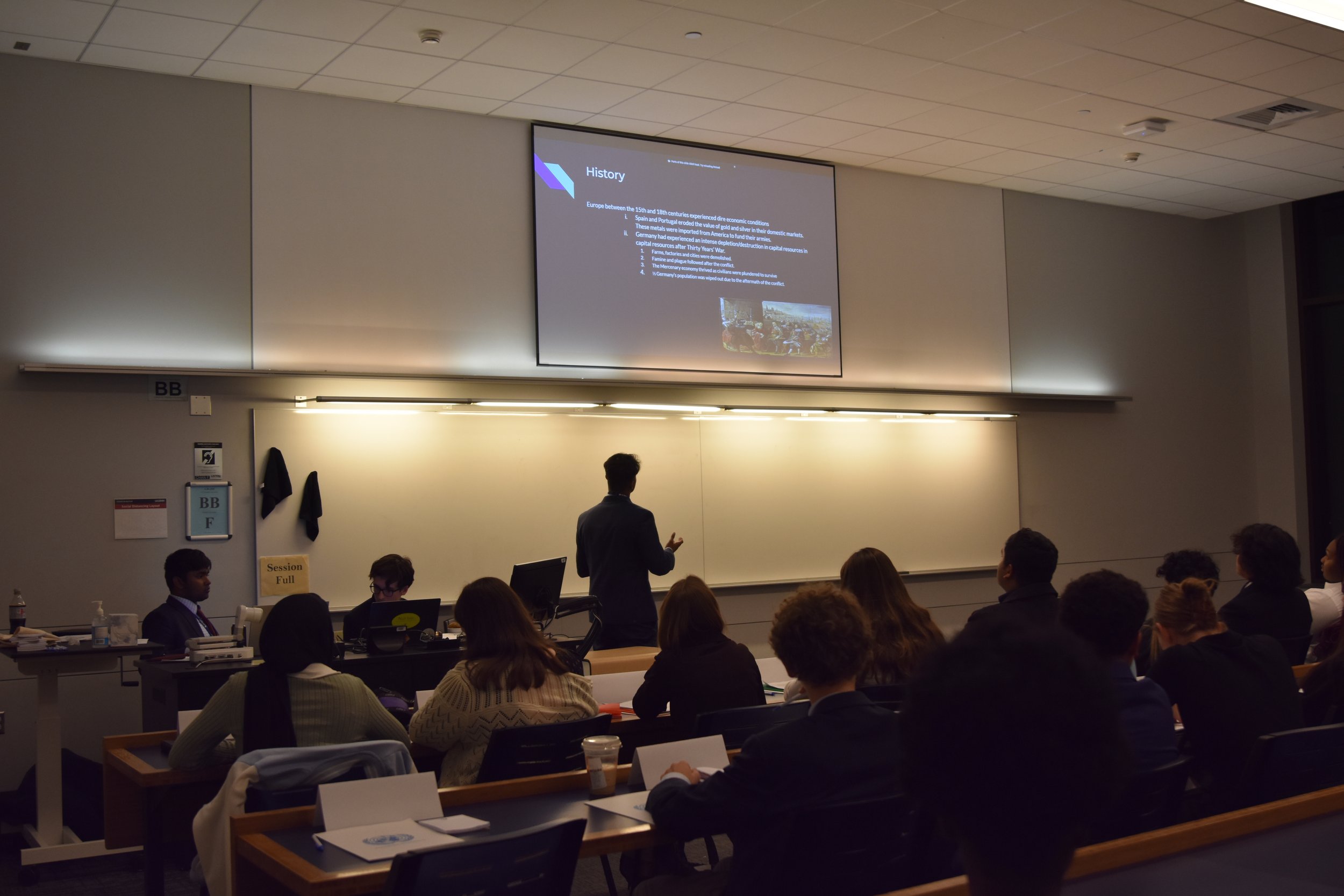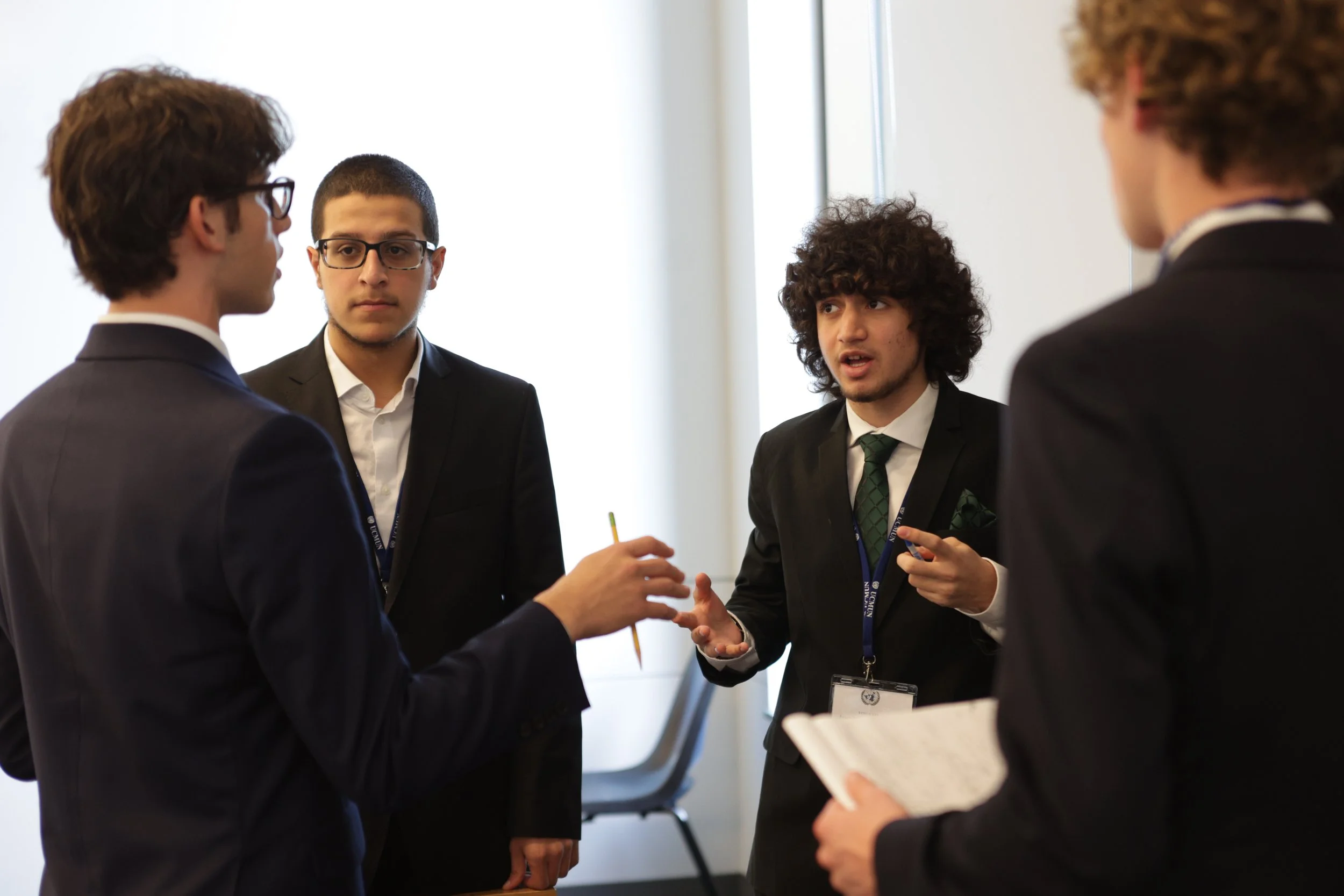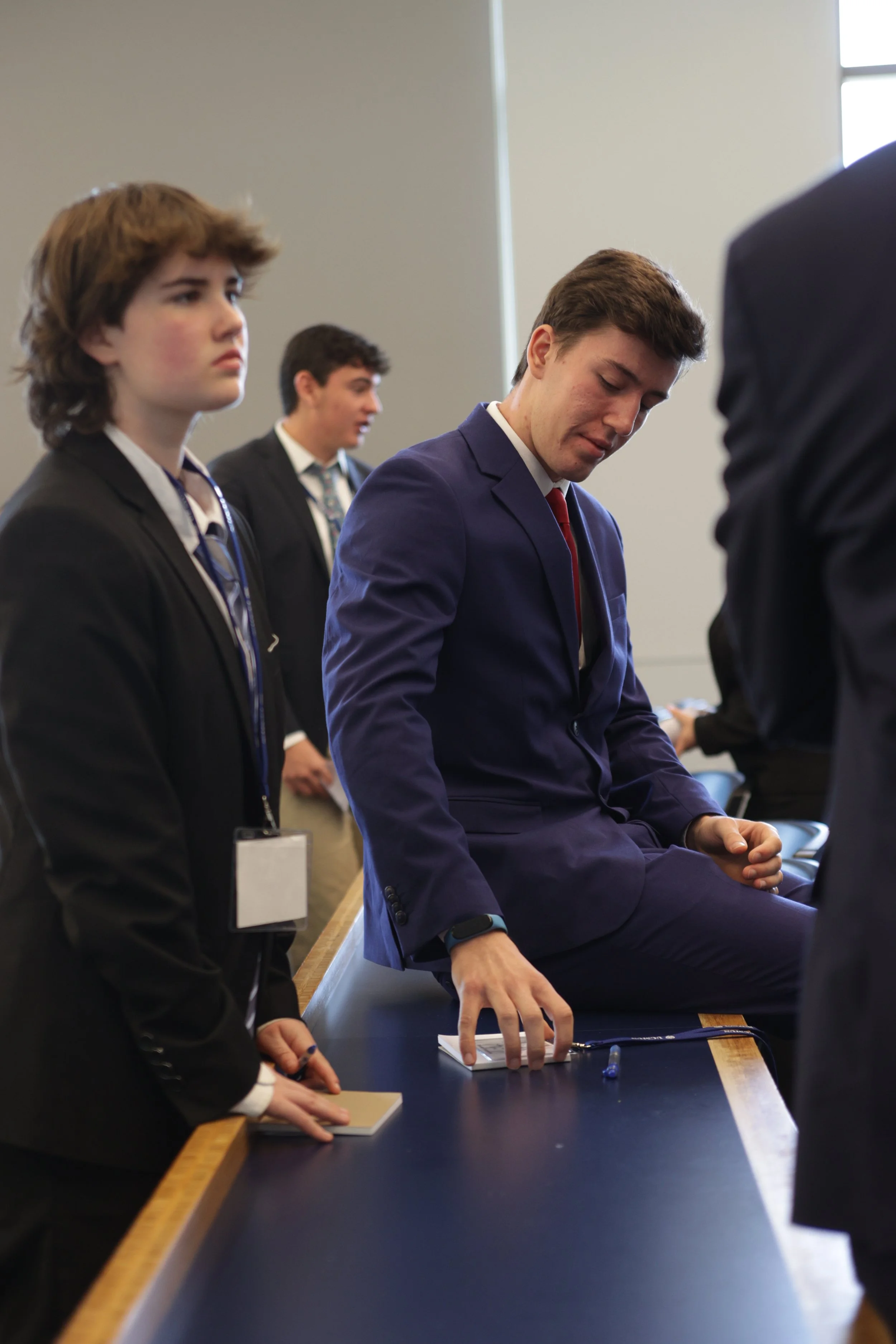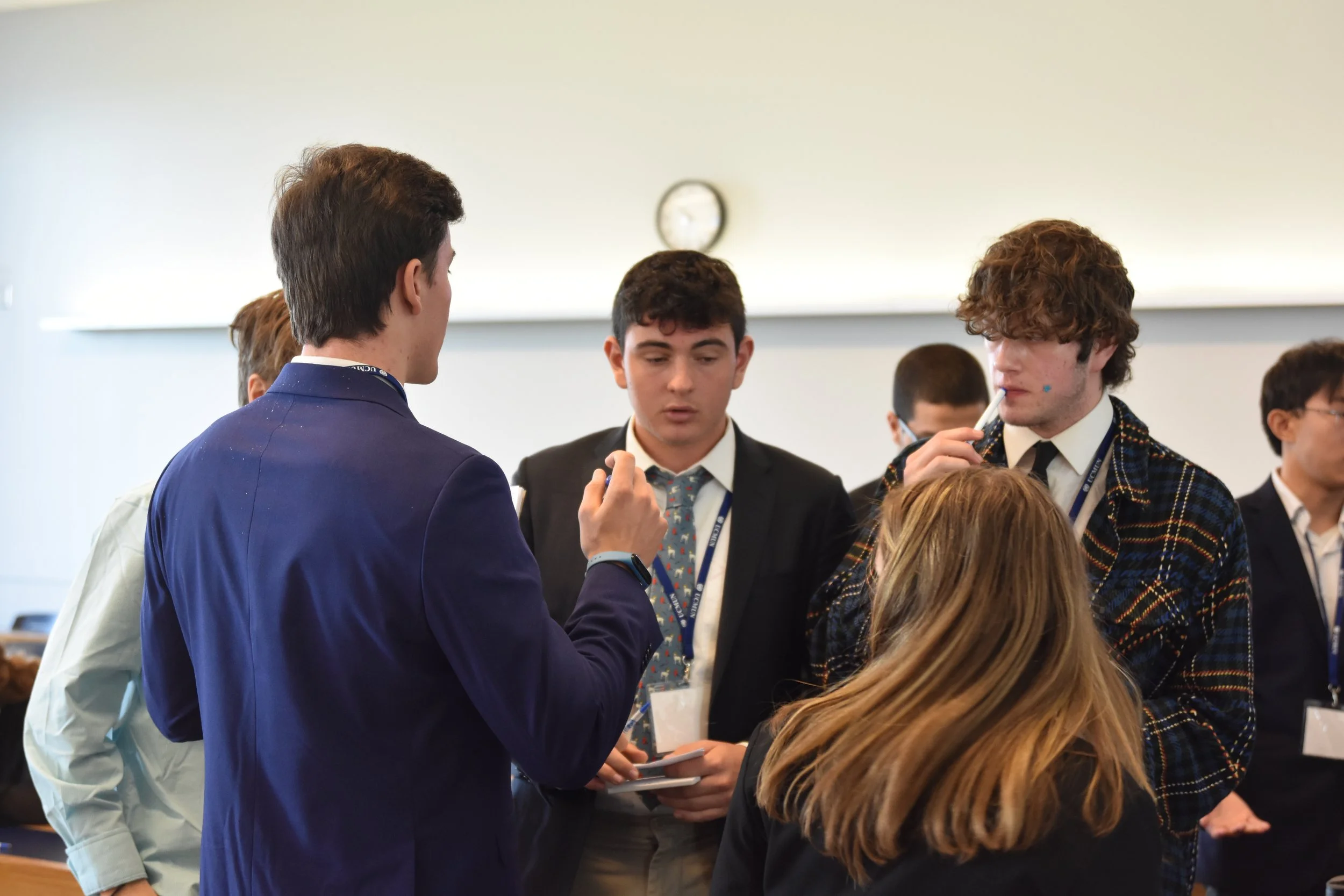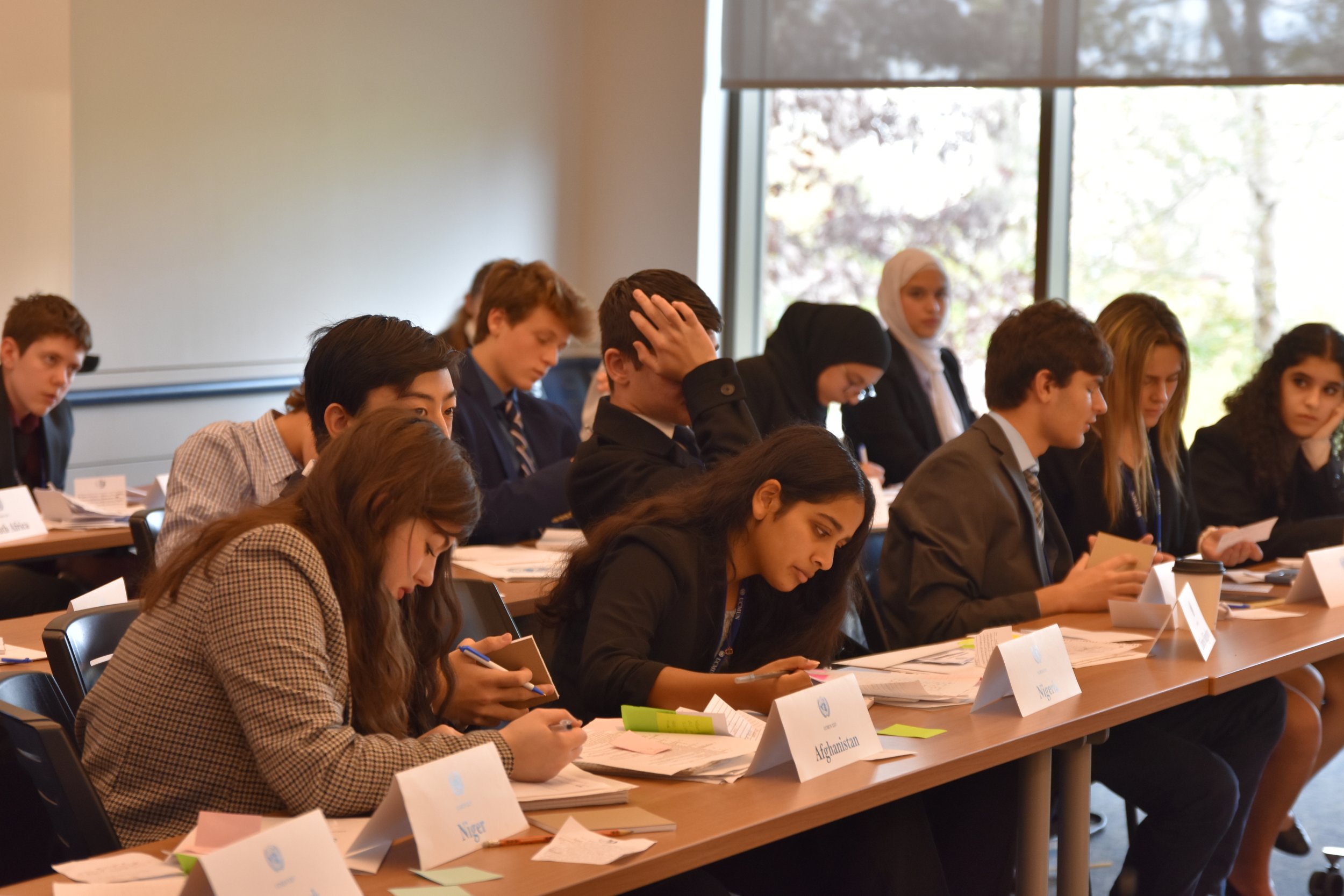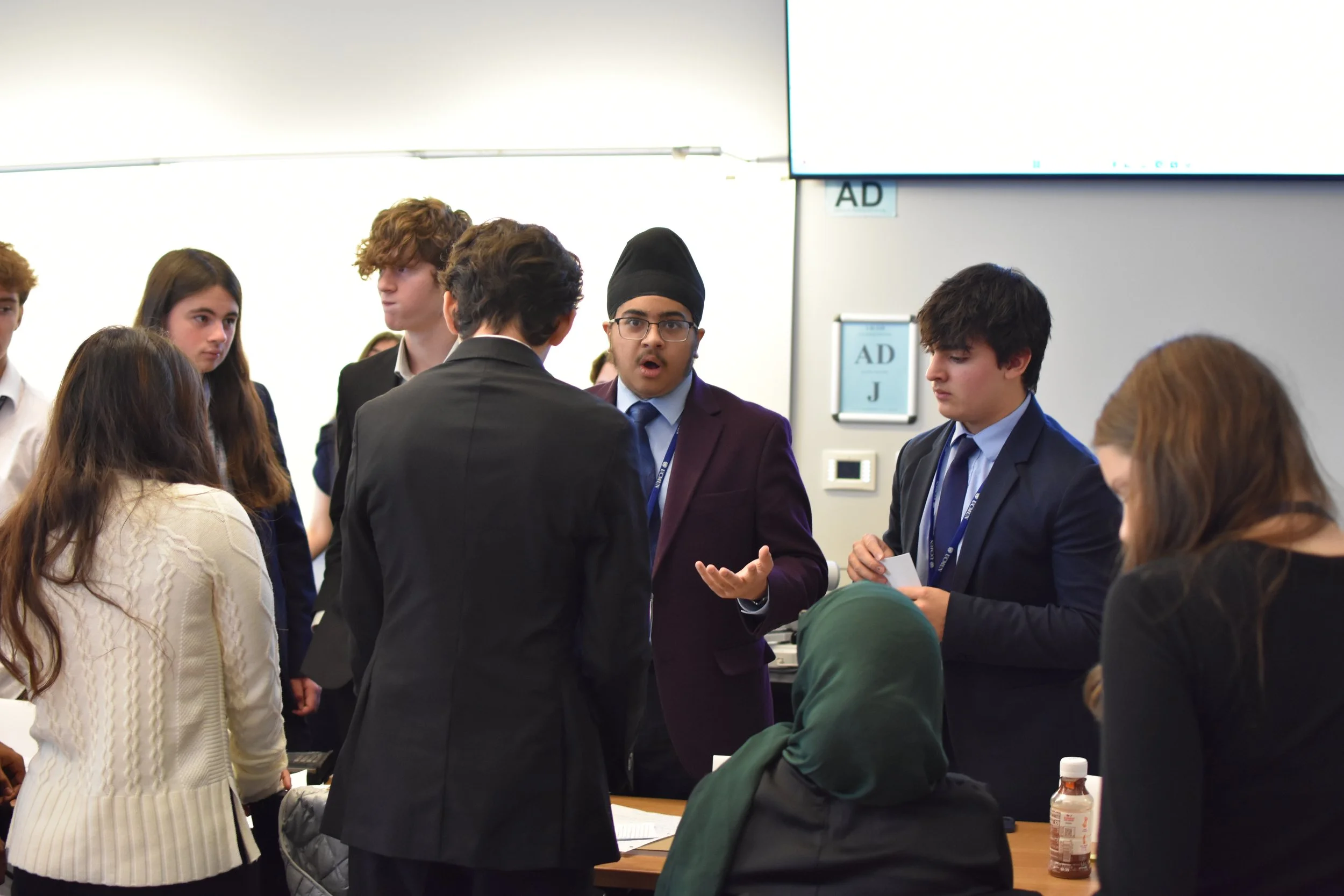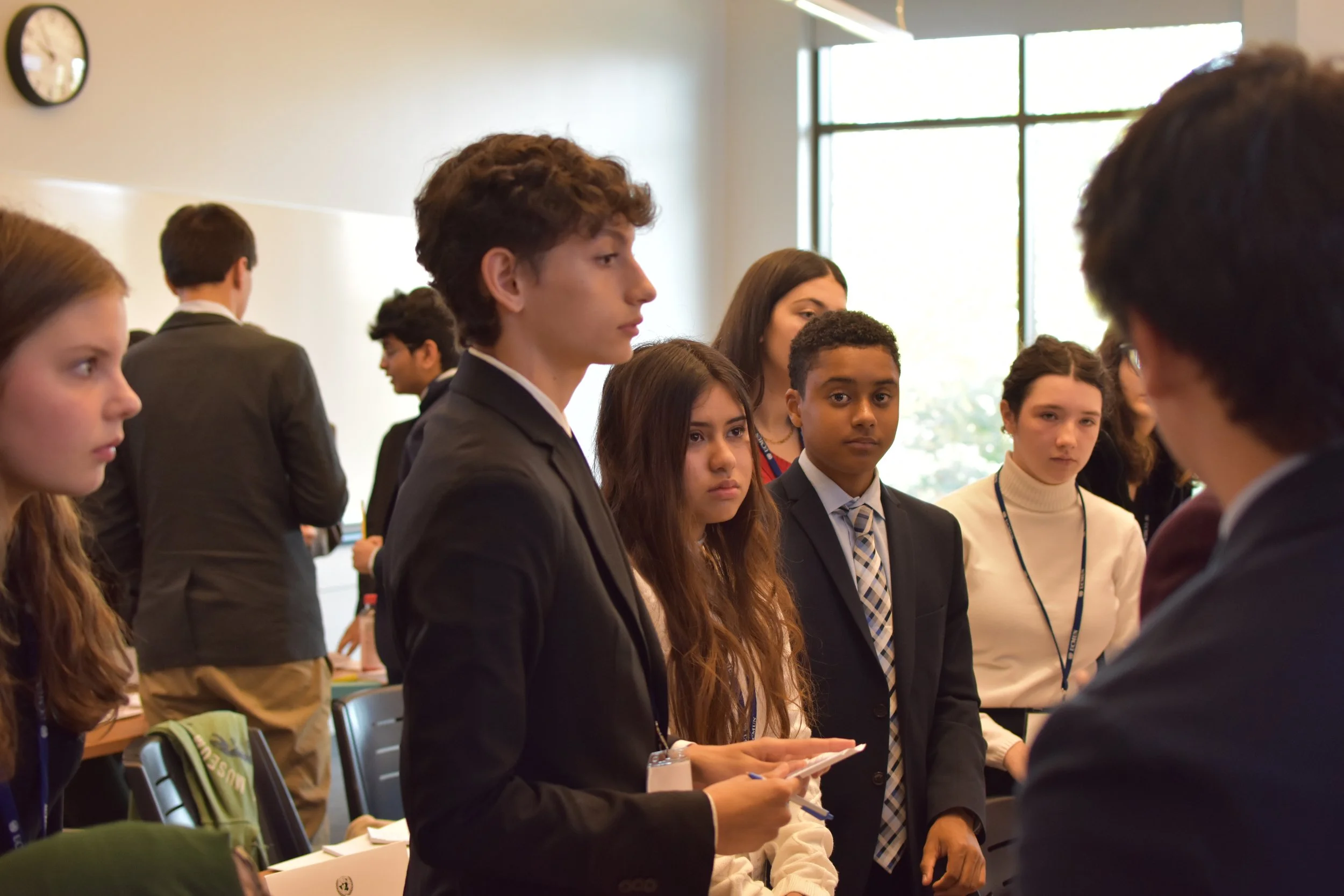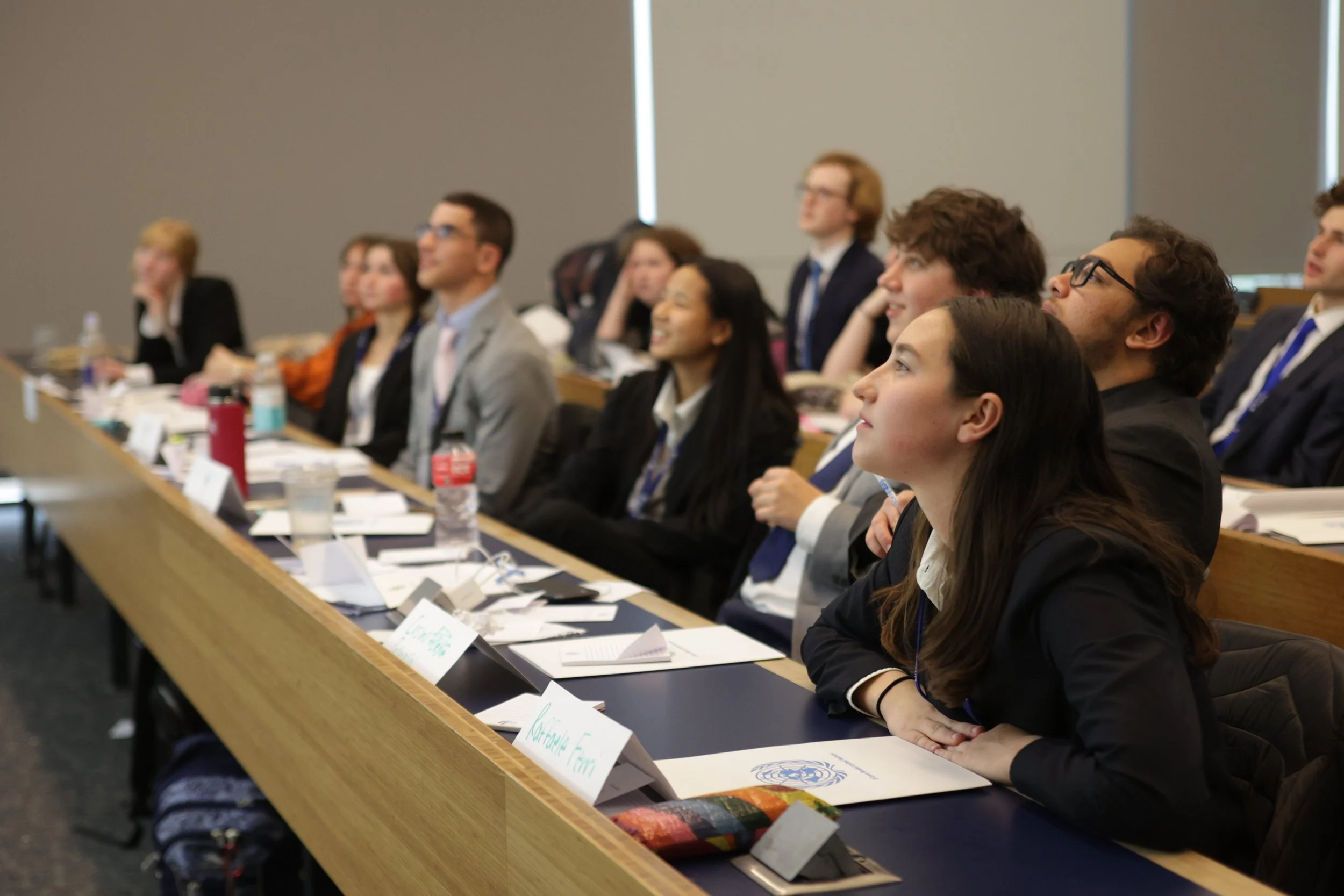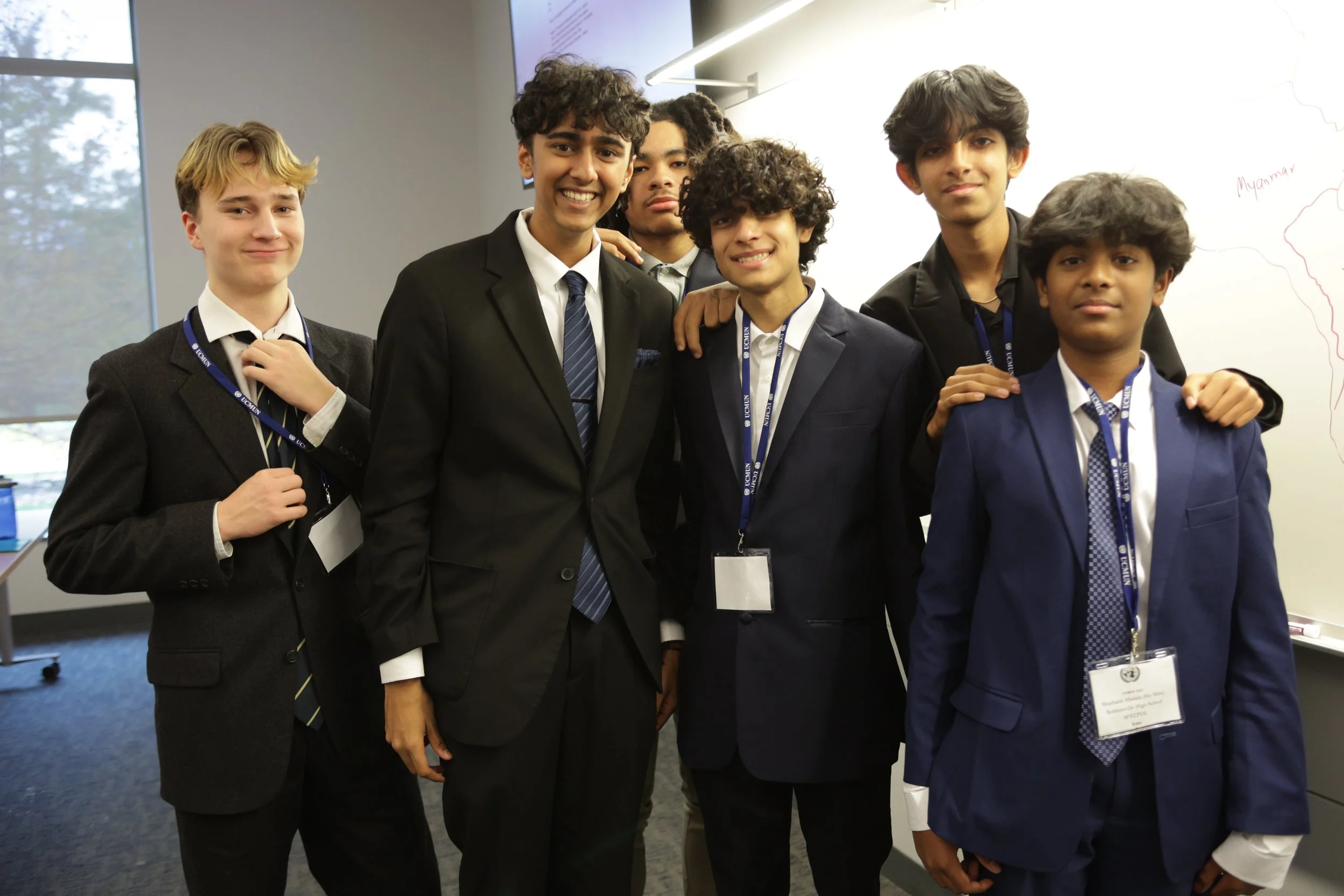Learn about what’s happening in different committees. Summaries are written by Anna Heqimi, a Press Corps staff member.
Opening Ceremonies
Bridget Abril, the Secretary-General of The University of Connecticut Model United Nations opened the UCMUN XXV ceremony. She first acknowledged the land in which we reside is of the indigenous people, then transitioned to state how topics during the three day conference are picked based on contemporary issues. Abril wants the delegates to take away three things from this conference: to know that they are capable of detailed research, to learn to speak confidently and to learn cooperation and collaboration. After Abril’s speech, the keynote speaker was introduced. Himaja Nagireddy is a Public Health Law Fellow at the CDC. She meets with thousands of young Americans to gain a deeper understanding of their concerns, priorities, ideas, and calls to action for the U.S. in order to advance global human rights. She praised the delegates telling them that they are young changemakers to build a collective of knowledge and to build their power and voice for global progress. She recalled how UConn inspired her to share her ideas and helped change her viewpoint from her voice to not mattering to her voice deserving to be heard. She enthusiastically mentioned that the delegates are joining a global movement to create this educational structure to build a better world. She concluded her speech to shout-out the organizers of the conference, saying “you are bringing young Americans to the UN and the UN to young Americans.” Jack Romine, the Director-General, closed the opening ceremony and said “the success of this conference lies on your shoulders.” He shared words of wisdom saying it is all right to make mistakes, as long as the delegates do not get discouraged from them. He told the delegates to have fun and take something away from it.
Economic and Financial Committee
The Economic and Financial Committee hosted delegates from around the world to discuss the global economic crisis from the Russian-Ukrainian war. Highlights of the delegates on the stand were Afghanistan, which stated that 9 million Afghans are living in famine conditions and that the ongoing war has a major effect on developing countries. The delegate of Australia mentioned that there are 17 million Ukrainians that are in need of humanitarian aid. The Delegate of Egypt highlighted the issue that its people are starving due to the inflated prices of grain. The Delegate of the French Republic said Eupore is dependent on Russian oil and proposed a goal in which every country can feed itself. The Delegate of Moldova discussed the abundance of Ukrainian refugees in their country and how they are unable to provide funds to Ukraine. The Delegate of Poland recognizes the disruption in trade as Russia and Ukraine are exporters of grain and energy. Many delegates addressed the Black Sea Grain Deal and how it should be reinstated. However, delegates of the committee are not allowed to make recommendations, they may only discuss what issues their respective countries are facing because of the war and what their concerns are for their citizens.
Commission on the Status of Women
The Commission on the Status of Women hosted delegates discussing the immense violence on Women in Afghanistan due to the Taliban’s influence in the country. Delegates proposed solutions to combat this humanitarian issue. The Delegate of Jordan proposed that Afghan men should understand the importance of women’s rights. The Delegate of Turkmenistan stated that there must be a reformation and modernization of Afghanistan. The Delegate of Iran proposed to gain back education for women. The Delegate of Saudi Arabia said there should not be funding for the Taliban, but instead, Islamic countries should host a summit to reduce terrorist tensions. The Delegate Of Switzerland mentioned the violence in Afghanistan impeding the quality of life, raising another issue related to this which is healthcare. Afghan women are forced into unwanted marriages, do not have access to vaccines and are getting illegal abortions due to unwanted pregnancies. After the delegates held their one-minute statements and recommendations regarding this issue, they had a five minute caucus trying to create a shared resolution.
United Nations Security Council
The United Nations Security Council committee hosted delegates to propose a resolution regarding the Nagorno-Karabakh Conflict. A speaking list was placed for each country to discuss the Armenia-Azerbaijan conflict The Delegate of China proposed reconciliation between Azerbaijan and Armenia and a multi-national security support mission. The Delegate of Israel proposed the demilitarization of the Nagorno-Karabakh region and provide humanitarian aid for the civilians affected. The Delegate of Armenia said its people are open to a shared state or separate state, but it is unfair for countries to blame Armenians for defending their home. The Delegate of Iraq said Russia should not intervene as both counties will feel threatened. The delegate also argued that Armenians are the main aggressors in this conflict and the countries must find a way to make the two fighting countries get along. The Delegate of Azerbaijan recognized that peace must be made by the two conflicting nations as opposed to foreign intervention. Several moderated caucuses were held to come to an agreement of how the issue is going to be resolved.
United Nations Security Council
The United Nations Historic Security Council hosted delegates regarding the Serbian military positions and presence in the conflicting countries of former Yugoslavia. Some of the amendments proposed were Amendment 1.3, disclosing the names of the countries willing to take in refugees such as Greece. Two-thirds of the sponsors must vote for an amendment, in order to be passed. However, Amendment 1.3 failed. The Delegate of Algeria proposed a motion for countries to each speak for 45 seconds regarding the conflict occurring in former Yugoslavia. That motion passed and the Delegate of Algeria addressed countries that must send humanitarian aid to citizens affected, especially for Serbia after recently being bombed. The Delegate of Pakistan made the point that humanitarian aid is useless if there is no civilization population left. Therefore, the crisis must be resolved. The Delegate of Italy wanted to use its location to send aid through Austria.
United Nations Children's Fund
The United Nations Children's Fund held a 10 minute unmoderated caucus to discuss child employment and child labor. After the unmod, delegates returned to their seats to share aloud their ideas and concerns regarding child labor policies. The Delegate of the United Kingdom understood the effects of what eliminating child labor could have on the economy of those countries that rely on their employment, such as a total economic collapse. The Delegate of France recognized that eliminating child labor is not feasible for developing countries. The delegate said children that are employed must still be required to attend school, must only work a specific amount of hours depending on their age and have safe working conditions. Most delegates agreed with this recommendation that the delegate of France stated.
World Health Organization
The World Health Organization committee hosted delegates to discuss Intellectual Property Rights. The Delegate of Ethiopia stated how companies should be incentivized to waive their Intellectual Property Rights so countries can obtain the medical supplies they are in need of. The Delegate of the United States of America stated that high income countries do not have incentives to donate to countries in need of resources. The Delegate of Ethiopia said there is nothing to gain from developing countries and the Delegate of the U.S. changed their statement in agreeance with the Delegate of Ethiopia. Whereas, the Delegate of Pakistan proposed the recommendation that low income nations should have trade relationships with high income countries to gain a more diverse community and because it is morally correct. However, high income countries do not see any reason to trade with developing countries, as high income countries see no potential gain. The Delegate of Pakistan claimed that high income countries will gain new spices as well as sugar, even though there should be a greater incentive. The delegates discussed how organizations such as Pfizer and Moderna that make billions of dollars should be lowering the cost of their materials for developing countries to gain access to their products, rather than the motive to be continuously enriching the businessmen of such companies. The argument is based on the fact that people in developing countries need medical supplies to ensure their health and well-being.
Historical Crisis Committee
The Historical Crisis Committee had a crisis pertaining to olive oil. There is an olive oil shortage which could cause potential famine and as the black plague is spreading, doctors are saying they are lacking the cure. The delegates were discussing the olive oil hoax, stating that it is not a preventative measure for the spread of the plague. Delegate Marino is called to be under investigation for the origin of the olive oil hoax. There was also an issue of the hoarding of olive oil, in which the delegates urge citizens to donate to the poor. A minor crisis suddenly arose as there was a break-in at Delegate Lombardi's olive oil storage. As a result, many people currently have access to olive oil that is now valueless. An unmoderated caucus was held to discuss the updates of this continuing crisis.
Special Political and Decolonization
The Special Political and Decolonization committee began the voting procedure for the final resolution, resolution 1.1, which requests the demilitarization of the South China Sea by a pledge of peace, fosters the economic prosperity and trade of the South China Sea by creating infrastructure of trading hubs and adopts further environmental protection by regulating oil rigs, as well as prohibits aircraft carriers and heavy cruisers form entering and crossing the South China Sea. Resolution 1.1 was passed 15 to 4.
Social, Cultural & Humanitarian
The Social, Cultural & Humanitarian committee held a 45-second moderated caucus for delegates to discuss human trafficking issues and what recommendations they proposed during their extended unmoderated caucus. The Delegate of Japan wants secured borders. The Delegate of Maldives wants to fund programs and work with independent companies to educate the public about the dangers of trafficking. The delegate also proposed using newspapers and radio to try to track victims of this global issue and understand their experiences. The Delegate of Ukraine, stated a unique remark, acknowledging that every country should have different initiatives based on their resources and prevalence of human trafficking and proposed a plan called “SPICE” regarding the investigation of this issue, the protection of citizens and the education of civilians regarding trafficking.
United Nations Human Rights Council
The United Nations Human Rights Council hosted delegates to discuss the human rights abuse that occurs in mines. The Delegate of Burundi recognized that its country has an issue regarding the topic being discussed and posed the resolution that mines be under state sanctions. The delegates of Nigeria and Switzerland agreed with this possible solution. The Delegate of Australia proposed education for children working in the mines so that they can stay safer and perform their job better. However, the Delegate of Angola believes that machinery should replace children working in the mines. The Delegate of Canada recognizes that children working in mines are economically beneficial but states that better working conditions are mandatory and agrees with the statements made by the Delegate of Australia.
Disarmament & International Security Committee
The Disarmament & International Security Committee began the voting procedure for Resolutions 2.1, 2.2 and 2.3. Resolution 2.1 to protect fishermen was passed. Resolution 2.2 regarding a crisis on pirates seizing a ship, failed. Delegates were happy with the results of the voting process and were enthusiastic about Resolution 2.1.



